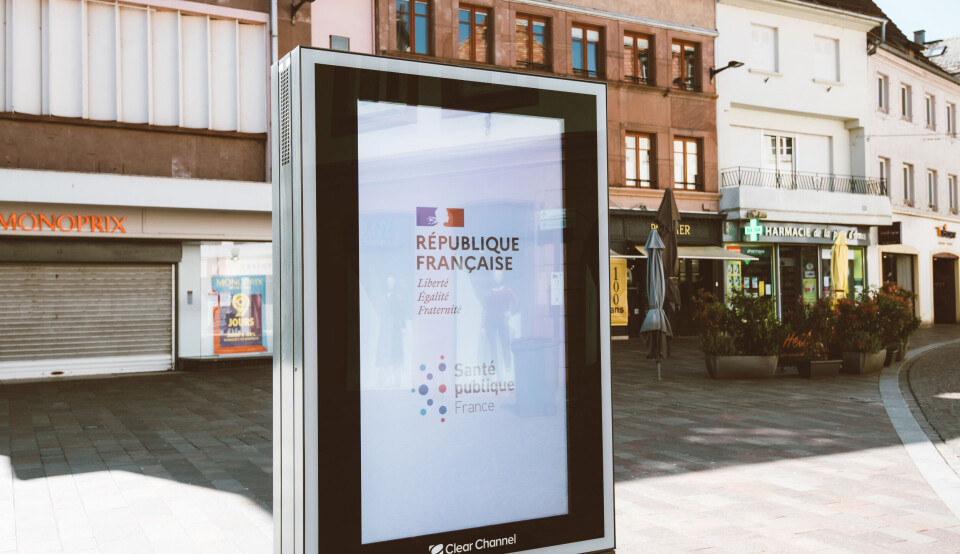-
Police across France hunt abandoned cars to free up spaces in urban areas
Vehicles cannot be parked on a public road in the same place for more than seven days
-
Senators examine proposal to guarantee access to cash machines in rural areas of France
Some 18.6% of French communes had access to at least one local ATM in 2024
-
French weekly weather forecast February 9-13: Unsettled with winds of up to 100km/h
Flood risk may increase in several regions and mountain conditions set to worsen
Will MPs back draft bill to ban digital advertising panels in France?
Critics of digital billboards say they waste energy and represent a new stage of the advertising invasion

French MPs are set to consider whether to ban digital advertising panels.
A parliamentary committee was due to discuss the issue on Tuesday (March 28) before the bill is presented to MPs next Thursday (April 6).
Campaigners say they waste energy, contribute to light pollution and damage health.
There has been a ban - introduced last October - on backlit advertising billboards between 01:00 and 06:00, except for airports and stations.
However, critics say this is not always respected and the restrictions should go further.
The draft legislation going before MPs next week seeks an outright ban on both digital signage (numérique), which displays a single, non-moving image, and illuminated (lumineuse) boards, which can display video, too.
The bill’s introductory text says the existence of such advertising is difficult to justify when French citizens are being asked to save power, whether that’s to tackle climate change or fight potential shortages linked to the war in Ukraine.
“What could be more useless than digital or illuminated billboards? For several years, digital advertising screens have been deployed massively in our public and visual space. They constitute a new stage of the advertising invasion,” read the text.
“This development of digital and illuminated advertising and the hyperconsumption society they promote are not compatible with the imperatives linked to energy sobriety, ecological urgency, the protection of public health and the quality of urban landscapes.”
Read more: Stop lit-up advert screens and private jets, urge French campaigners
Publicity petition
Meanwhile, the associations Résistance à l’Agression Publicitaire, Plein la Vue, Greenpeace, Alternatiba, ANV-COP21 and Extinction Rebellion France have launched a petition in favour of more switch-offs, which, at the time of writing, has nearly 66,000 signatures.
The group is petitioning the French parliament to ban all backlit, digital, or light-up publicity on public roads and in airports, train stations, and public transport stops.
The ban would also apply to light-up publicity indoors that can be easily seen from the street. However, it would not apply to signs displaying important public interest and non-commercial announcements.
Eco campaigners say that a 2020 report by ecological agency Ademe found that a 2m2 screen consumes 2,000 kWh per year, the equivalent annual electricity use for one household (except heating and hot water).
They state: “Publicity screens represent a real incoherence in a society that is increasingly affected by the ecological and social emergency, within the context of the energy crisis and calls for energy saving.”
They have called for measures that would “definitively free our public spaces, stations, and public transport from advertising screens”, and an “energy saving plan that would take structural measures to target uses collectively defined as incidental or harmful”.
Government signatories of the petition include MPs Julien Bayou, Cyrielle Chatelain (Green), Mathilde Panot and François Ruffin (La France Insoumise), and Dominique Potier (Socialist).
Senator Thomas Dossus, MEPs Manon Aubry and David Cormand and Grenoble mayor Eric Piolle have also signed.
Billboards and ugly advertising screens have long been controversial in France.
Some mayors have banned them from their towns, while the tongue-in-cheek ‘La France Moche’ (‘Ugly France’) competition regularly chooses streets and areas with many advertising and publicity signs to be among their winners.
Related articles
More towns take away street advertising signs in France
Billboards: Are these the four 'ugliest' towns or villages in France?
























